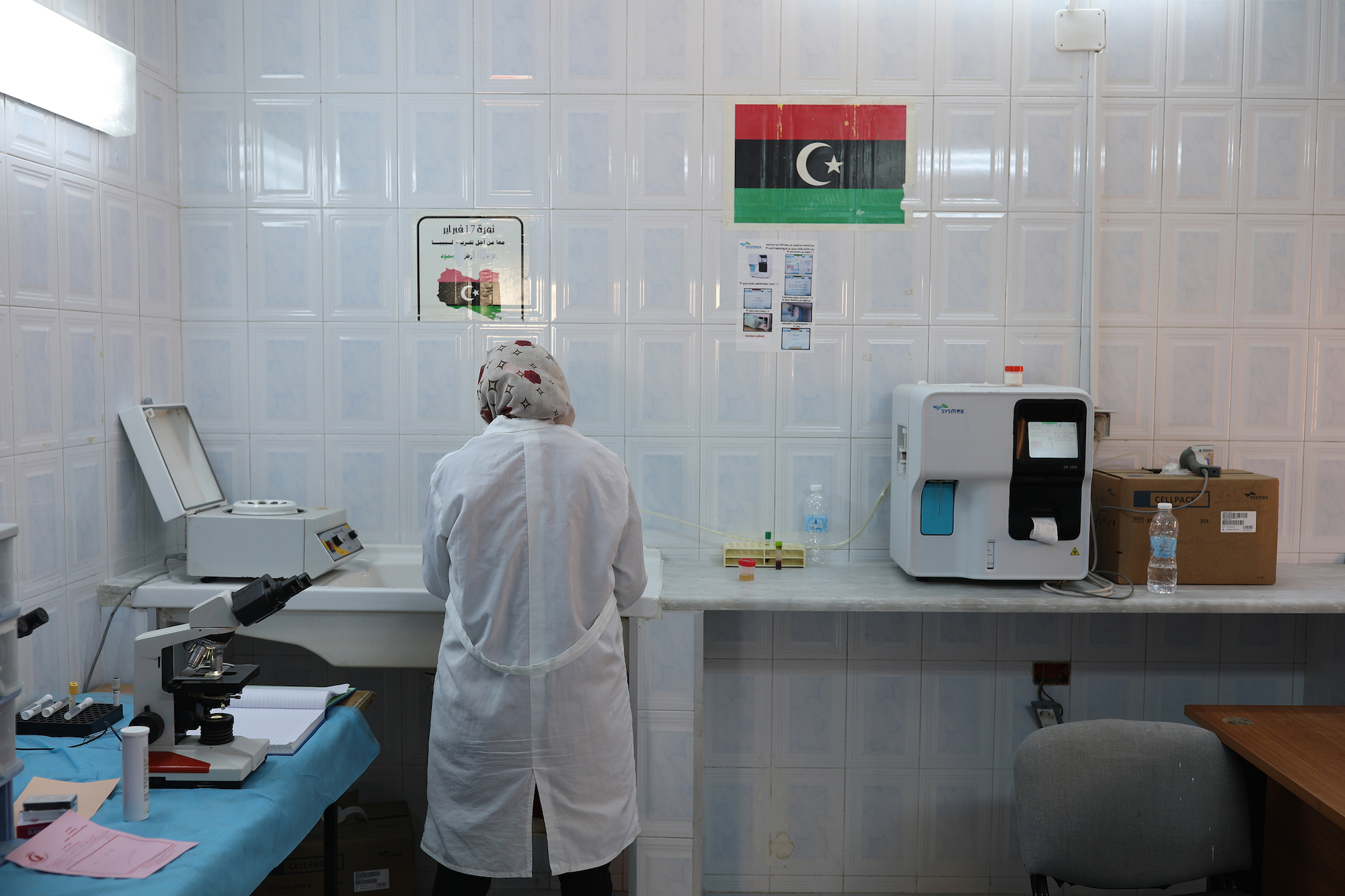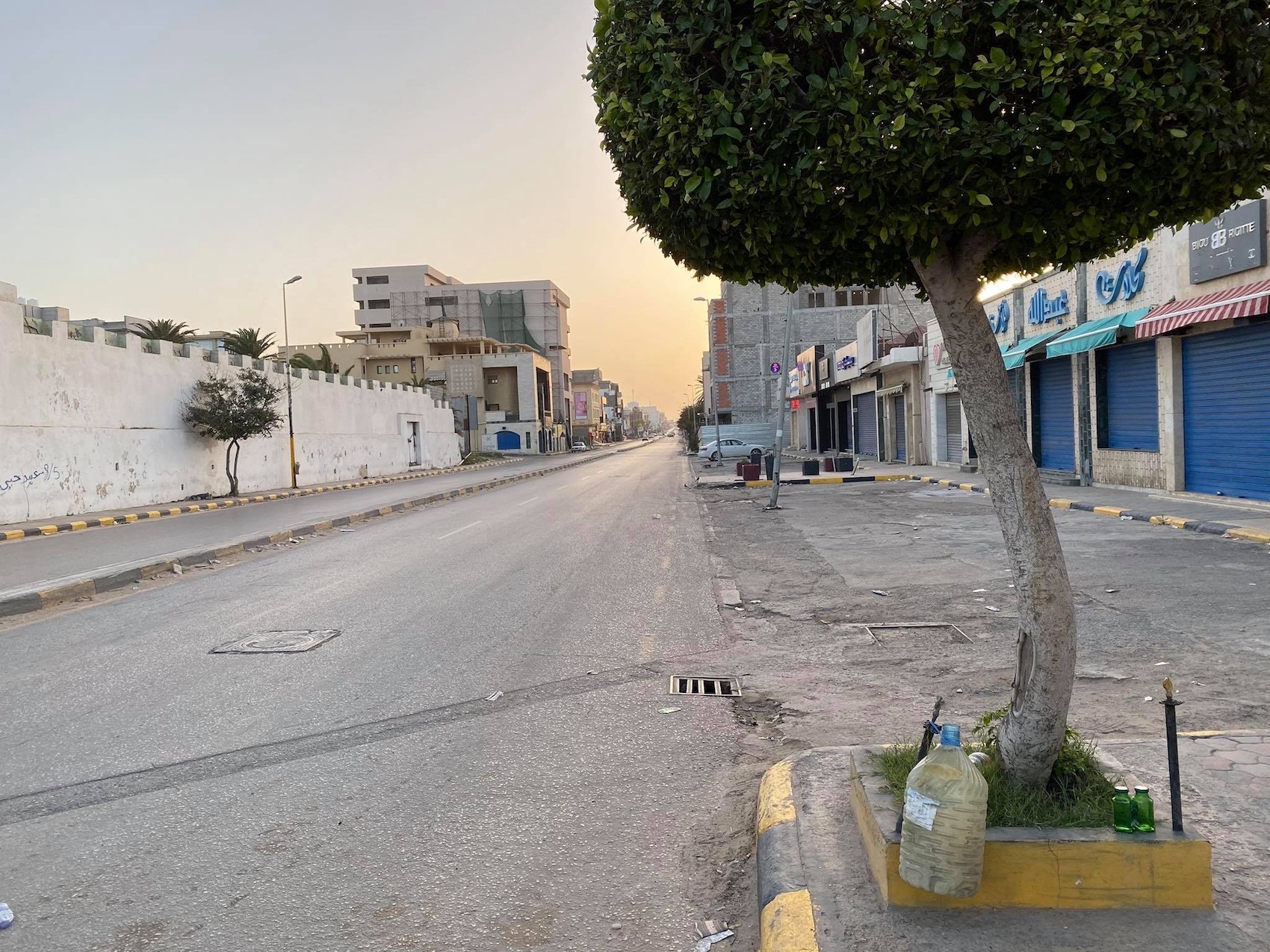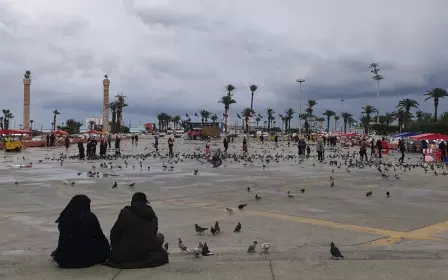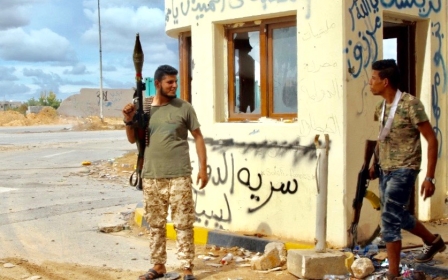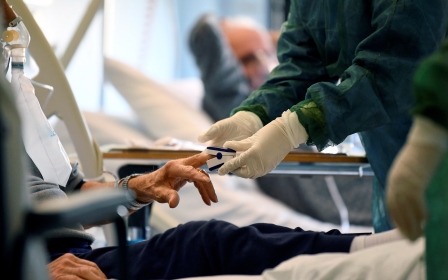Coronavirus: Libyans brace for uncertainty as the country battles war, economy and virus
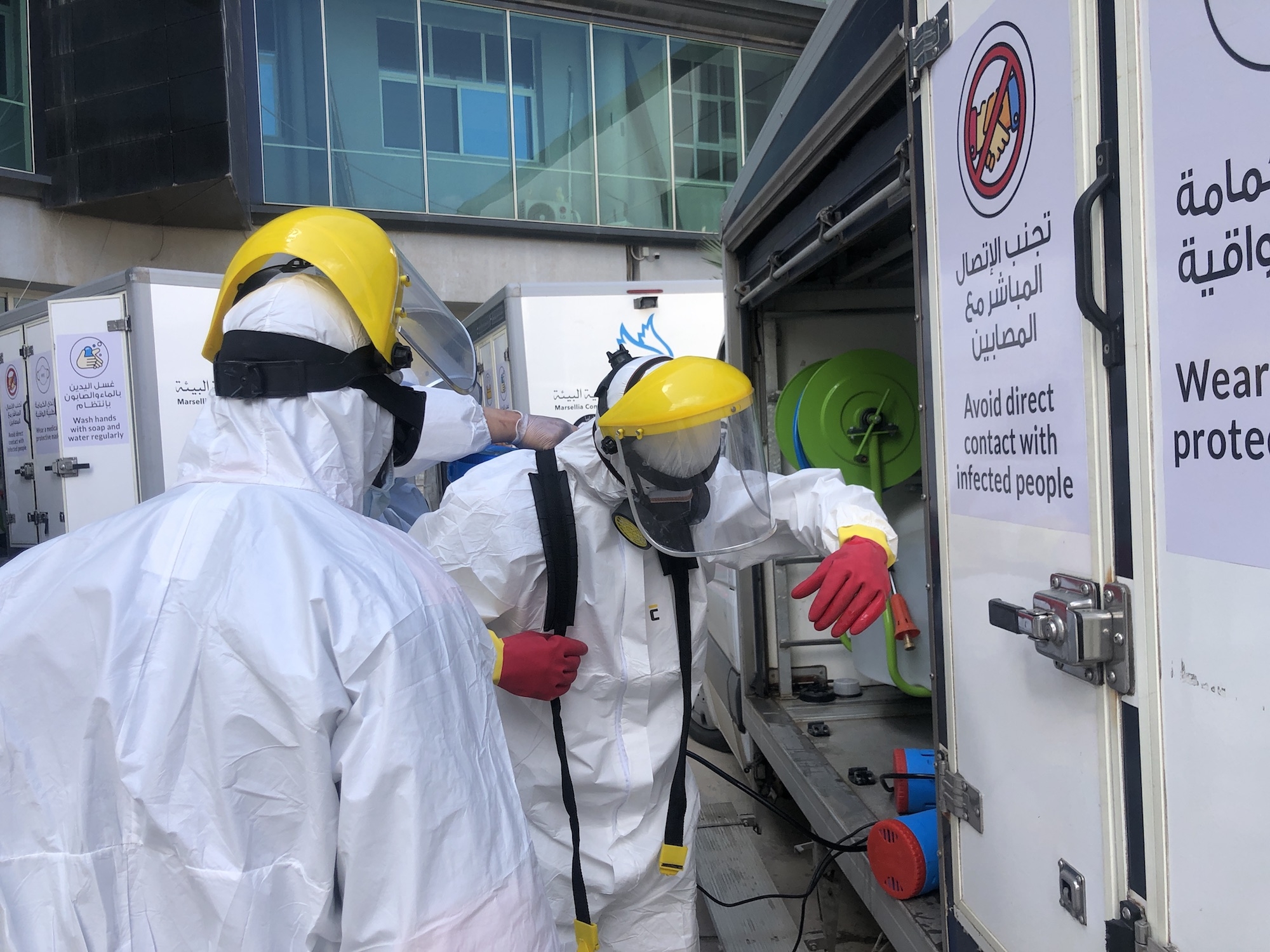
Up until the moment the first coronavirus case was announced in Libya, citizens were still hoping that the country would be spared the global spread of the pandemic, due to its isolation from the world caused by its ongoing civil war.
But now, after almost a decade of bloody conflict and economic turmoil, Libya is facing a new battle - this time against the novel Covid-19.
As of 29 March, Libya has reported eight confirmed cases of infection, with the number expected to rise.New MEE newsletter: Jerusalem Dispatch
Sign up to get the latest insights and analysis on
Israel-Palestine, alongside Turkey Unpacked and other MEE newsletters
The National Centre for Disease Control said the new cases were in the northwestern city of Misrata, held by the Tripoli-based Government of National Accord (GNA), which is at war with the Libyan National Army (LNA) of eastern-based commander Khalifa Haftar.
Many Libyans are taking matters into their own hands.
"I called my brother, who works at a bank, and asked him to postpone any upcoming visits to my house for the safety of my little son, who has just turned 18 months old."
This was how Mohammed Jabrel, the head of a three-member household, reacted after the official confirmation of Libya’s first case of the coronavirus on 24 March.
Now, many fear that the country’s health sector will collapse under the weight of the virus outbreak.
The rival governments have been fighting to take control of the country since the fall of longtime dictator Muammar Gaddafi, destroying much of Libya's infrastructure along the way, leaving it poorly placed to withstand any epidemic.
Libya was identified as one of the 27 countries “most vulnerable to emerging outbreaks of illness" in a Global Health Security (GHS) Index report published in March.
The United Nations has urged warring parties to stop fighting so the overstretched health system can prepare. Despite a truce that went into effect on 12 January, fighting has continued, with each side blaming the other for starting it.
Life on pause
According to the country's health minister, the first coronavirus patient entered Libya on 5 March through Tunisia, after performing Umrah in Saudi Arabia. When the patient’s test came back positive for Covid-19, he was immediately transferred to the Department of Communicable Diseases at Tripoli Central Hospital, where he is currently receiving treatment and in a stable condition.
The patient’s family and those he had been in contact with had also been tested for the virus, the National Center for Disease Control said.
Since mid-March, the Government of National Accord has implemented a series of measures to tackle the epidemic, starting with the allocation of half a billion Libyan dinar (around $350m) to combat the virus outbreak.
Sea and land borders have been locked. Classes at schools and universities have been suspended, as well as prayers in mosques. The issuance of marriage licences is postponed until further notice. Non-essential shops and markets are closed, and a daily curfew is in place after 6pm.
Judicial officials had also released 466 detainees from correctional facilities in Tripoli, according to a statement by the GNA's justice ministry, to help contain the spread of the coronavirus.
Life across Libya has come to a halt - except for the continuous sterilisation of government buildings in the capital Tripoli, and the ongoing fighting.
Overstretched health system
Years of instability and violence have left much of the North African country's medical infrastructure in ruins.
Prior to the coronavirus outbreak, the dilapidated state of Libya’s health sector had already forced many citizens to seek medical treatments abroad - in countries like Tunisia, Egypt and Jordan - despite the high costs due to a poor exchange rate.
As Covid-19 spreads across the Middle East, private clinics in Libya - which constitute more than two-thirds of the country’s medical capacity - are feeling the pressure.
One major clinic in Tripoli took to Facebook to announce that it would not receive cases with coronavirus symptoms, but retracted the post after being hit with a wave of anger from residents.
Health officials say they are doing everything they can to contain the spread of the disease.
Dr Abdulla Bashein, head of the Laboratory Molecular Diagnostics Unit at the National Center for Disease Control, tells MEE that the laboratories are ready to tackle the coronavirus outbreak, but admits there is “deficiency” in some equipment.
In the face of the encroaching new virus, shielded by a fragile health system, many Libyans are rightfully worried.
“We do not have the ability to respond to this epidemic,” Jabrel, who works for an oil company, tells Middle East Eye.
He has been “obsessed about this disease” and following its movement closely, since the coronavirus was first reported in Wuhan, China, in December.
"I have tried to get ready for the epidemic by buying some extra amount of everyday essentials, such as baby milk and food items.
“Because I have come to the conclusion that there is no health care unit - public or private - that I can trust in case any family member got infected with the virus,” Jabrel says.
To keep him and his family safe, Jabrel now practices social distancing by “staying at home and avoiding crowded places”.
Rising commodity prices
Libya is a country that relies entirely on imports to meet the needs of its domestic market.
For years, Libya has witnessed continuous fluctuations in the prices of food due to the ongoing war and the constant movement of the exchange rate of the local currency, dinar, against the US dollar.
Now, the decision to close land borders has led to the doubling of fruit and vegetable prices in local markets, since they have to be imported from Tunisia.
Suppliers are also expecting to see a severe shortage of produce across the country in the near future, as most of the agricultural lands around the capital have become battlegrounds since last year.
But as of now, there is no noticeable shortage of food supplies or daily essentials in the markets.
Just like its health system, Libya’s economy has been ravaged by political division and wars inside the country for years. Longstanding policies introduced during the Gaddafi era mean that most Libyans depend on the government for salaries, which many say have not been paid in months.
On 24 March, the parallel central bank in Benghazi, set up by the eastern administration, said that it paid salaries to government workers in eastern Libyan areas for the first time this year.
The news resulted in crowding at banks and markets as people tried to retrieve these accumulated salaries, inadvertently creating a fertile environment for potential coronavirus transmission.
'Even though we are used to the fact that the state is rarely honest in its declared numbers, personally, I do not believe these statistics'
- Hosam Alosta, Libyan
In the private sector, employment usually comes without the security of a contract, so the closure of markets and stores will likely lead to a drop in income for tens of thousands of workers.
Ramzi Omran, who owns a number of women's clothing stores, says the shutdown of shops has made a bad situation worse.
“Even before the curfew was implemented, the market situation was already stagnant, as sales generally slow down from the first week of March,” he tells MEE.
Now, with closed shops and no customers, “we simply cannot pay the employees' salaries,” Omran says.
Despite the preventative measures already implemented by the government, some Libyans say the state has not fulfilled its duty to its citizens and call for more actions to stop the infection from spreading.
"Until this moment, there are still land and air travels coming into Libya from Egypt, Tunisia, and Turkey, and this poses a great danger,” Hosam Alosta, who is married and employed in the private sector, tells MEE.
He doesn't trust the government and its decisions.
“Even though we are used to the fact that the state is rarely honest in its declared numbers, personally, I do not believe these statistics. Even curfews and the closure of markets, factories, and stores, I see it as a defective decision because it was not followed by financial support for the private sector,” Alosta says.
“Starting from next month, I won’t get my salary, because the company I work for has closed its doors.”
The new normal
The restriction on people’s movement is something new for Libya, where social interaction is abundant and deeply rooted in customs and traditions.
Family visits, meetings in cafes and markets, and prayers in mosques are considered the Libyan lifestyle, says housewife Najwa Tawfik, who is not fazed by the latest government measures.
“Fortunately the epidemic arrived late to Libya. This gave us some time to see what happened with the other countries, then we gradually adapted to the idea of imposing a complete curfew even before the official decision was issued,” she says.
“Because of this decision, which forced us to stay at home and refrain from contact with others for the sake of our safety, I feel secure, and my family as well.”
Conflict escalating
Since April 2019, forces loyal to Haftar have been fighting to seize the capital in an offensive that has killed hundreds and displaced 150,000 people.
The conflict escalated last week when pro-GNA fighters mounted assaults on several fronts with clashes, bombardments and air strikes. Haftar’s LNA had earlier been shelling Tripoli.
UN chief Antonio Guterres has expressed concern and urged both GNA and Haftar forces to observe the truce.
"Given the already dire humanitarian situation in Libya and the possible impact of the Covid-19 pandemic, the secretary-general calls on the parties to join forces to address the threat and to ensure unhindered access of humanitarian aid throughout the country," a statement said.
Middle East Eye delivers independent and unrivalled coverage and analysis of the Middle East, North Africa and beyond. To learn more about republishing this content and the associated fees, please fill out this form. More about MEE can be found here.


